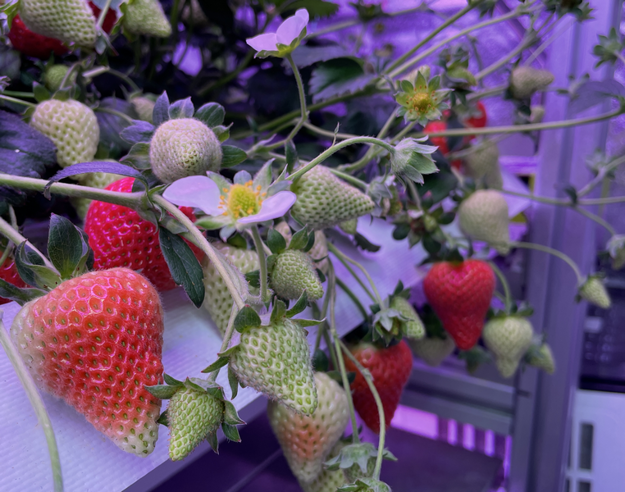Vertical Future was appointed as the lead organization on a DEFRA-funded research project through Innovate UK, aiming to optimize the propagation environment of strawberry plants in indoor vertical farms while maximizing yield potential to reduce the UK's reliance on imported produce.
"Strawberries have gone from being a highlight of British summers to a year-round staple, but this has meant a boom in imports of the crop. Innovation is also required to produce high-quality, disease-free, pre-programmed strawberry propagules with guaranteed high cropping potential for all UK growers, whether in polytunnels or vertical farms. Our R&D farm and berry research site will be a vital part of the project, along with our UK-designed and built vertical farming software and hardware," shares Jennifer Bromley, Chief Scientific Officer of Vertical Future.
The project will grow strawberry plants (propagules) in vertical farms before being transplanted into glasshouses or polytunnels. These high-health plants can produce a 40% higher yield, allowing farmers to grow more strawberries in the same growing area. The increased fruit productivity will be driven by controlled environmental conditions such as temperature, relative humidity, and light to optimize flower induction and plant development, which can enhance production in polytunnels.

The three-year project will research new methods to produce high-quality, high-yield, and disease-free strawberry plants within a vertical farm environment for onward cropping in polytunnels, glasshouses, and vertical farms. This will guarantee quality produce all year round, reducing the UK's reliance on imported goods and increasing revenues for the UK strawberry industry.
With the rising fears of global food insecurity caused by the rapidly rising global population, extreme weather conditions caused by climate change, along with political factors such as the Russian invasion of Ukraine and Brexit, maximizing the amount of locally grown fresh produce through technology-based innovations is imperative in reducing the economic and environmental costs affecting the agriculture industry. The unreliable nature of the UK weather limits effective and efficient propagation, making advanced vertical farming an ideal environment for producing consistently high-quality strawberry plants.
To deliver the project, Vertical Future is working in partnership with various agri-tech and berry industry leaders. The partners are the National Institute of Agricultural Botany (NIAB), the University of Reading, Berry Gardens Growers Limited, Hugh Lowe Farms, Clock House Farm, Linton Growers, Blaise Plants, Delta-T Devices, and Cocogreen.
Adam Whitehouse, Project Leader - Strawberry Breeding at NIAB, said: "NIAB is excited to be working in partnership with Vertical Future, and we look forward to actively participating and contributing to this project along with the other participants. Our established expertise and resource in soft fruit research will help play a vital role in refining and maximizing research-led outputs that can be scaled to a commercial setting in a sustainable and cost-effective way."
Andrew Barclay, Propagation Manager at Linton Propagation, said: "As part of Clock House Farm, Linton Propagation has been leading soft fruit growing innovation since 1903, and we are excited to be playing a part in the industry's next chapter. We, alongside fellow propagator Blaise Plants, will be providing commercial trialing expertise and industry insights, as well as guiding exploitation and commercialization activities, including selecting the varieties of fruit that will appeal best to consumers."
Professor Paul Hadley, University of Reading, said: "Strawberries are a firm favorite with UK consumers, and we are proud to be participating in research to make them more sustainable. We will provide expertise in photo-thermal responses in propagules and CEA cropping systems to analyze the performance of the varieties and provide guidance to the team on how to improve efficiency."
 For more information:
For more information:
Vertical Future
www.verticalfuture.com
